- Home
- Dan Abnett
Penitent Page 10
Penitent Read online
Page 10
The angel followed us, just walking, a few paces at our backs. He seemed oblivious to his own nakedness, or his impossibility.
Lightburn kept glancing back, and walked at a good distance apart from me.
‘What is your story?’ I asked, over my shoulder.
‘I have none,’ the angel rumbled.
‘Surely–’
‘I existed in the darkness, and the darkness was endless. I did not live, I just existed. I was in the darkness, chained to a rock, and wracked by maddening thirst. Whole ages of the world turned, I’m sure, while I suffered that torment. What world is this?’
‘Sancour, in Angelus,’ I replied.
‘And the date?’
I told him that too.
‘Those things mean nothing,’ the angel said. ‘I remember nothing.’
‘You know your name,’ I said. ‘And you know about nulls.’
‘Yes,’ he admitted. ‘But it is all a fog. There was a war. No beginning or end. I was wrought in it and for it, my rage bred to be turned upon the foe. A calamitous thing. The end of all things. I wore red.’
‘Who fought?’
‘I did.’
‘But for what cause, and against–’
‘I do not know, null. Just a blur of red. Of flame. Of death. My enemy was whatever I saw. Thus I was commanded.’
‘By whom?’ I asked.
I looked back at him. He had halted. He eyed me sadly, and shook his head.
‘I have no idea,’ he replied.
‘Well,’ I said, ‘your name is Comus Nocturnus. I believe you are of the Ninth Legion Astartes, called the Blood Angels. I do not know why you are winged, or driven by blood-thirst. I do know you are not the only one of your kind. In Queen Mab, we will find you some answers.’
‘Who is Queen Mab?’ he asked.
‘The city,’ said Lightburn.
‘And who are you?’ he asked.
‘I am Beta,’ I said, ‘and this is Renner. I would ask you note us both well, and do us no harm.’
‘If you command it,’ said the angel. ‘I was bred to obey.’
‘Then I command it,’ I said.
The angel nodded. I turned my cuff on.
‘Are you mad, woman?’ Lightburn gasped.
The angel sighed. The madness in his black eyes did not return.
‘I have been commanded,’ he said. He sniffed.
‘Is that rain?’ he asked.
We emerged into the downpour in the shadow of the old Gault Manufactory east of Highgate Hill. The last hour had been a climb up mouldering steps and ragged slopes, leaving the buried palace underground as we tracked through sewers and storm drains to the surface proper.
It was dark, and the storm had not abated. Lightburn sat on a low brick wall to ease his feet. Comus stood in the rain, his head tilted back, eyes closed, and let the water wash the blood off his skin. Lightburn watched him.
‘What kind o’ life do you lead,’ he asked me quietly, ‘that such things are everyday to you?’
‘They are not.’
‘Yet you take ’em in your stride. And I still don’t know nothing about you, nor your line of work.’
‘I am an agent of the Throne,’ I said. No matter which side I stood on, I knew that to be true. ‘There’s a man I want you to meet,’ I said to the angel. ‘I believe he might be able to help you.’
‘Can he help me?’ Lightburn asked.
‘You he already knows, so stay by my side and keep your counsel. I will vouch for you.’
‘Does he not like me?’ Lightburn wondered.
‘He will like you because I will tell him to,’ I said. ‘Now, come on. We’re going to Talltown.’
‘On foot?’ Lightburn asked, getting up. ‘We’re to walk through the streets with…’
He didn’t finish the sentence, merely gestured to the naked, winged giant.
‘If we have to,’ I said.
So we did. The storm and the hour had entirely emptied the streets. Rain belted, and lights shone behind window shutters. Once, a lit tram rattled past in the distance. I saw the faces of half a dozen sleepy or drunken passengers gawp in our direction, but then we were gone from their view, and I knew they would disbelieve themselves come morning. Lightburn pulled up his hood and trudged with his hands in his pockets. The angel padded behind us, without modesty, marvelling at the empty streets and the city buildings.
‘This city,’ he remarked, ‘it smells new.’
‘It is the oldest place I know,’ I said.
‘Fresh and new,’ the angel insisted, ‘as if it was built yesterday.’
We were crossing Eelhigh Square, empty of any other people at this hour, when I heard a familiar crackle in the driving rain.
‘There you are.’
Cherubael drifted into view like a sad, lost kite, and bounced weightlessly off the pavement in front of us. He had appeared without warning. When he travelled abroad in the city, his daemonic gifts cloaked him from casual gaze.
‘Ooooh,’ said the daemonhost with some concern, ‘little thing, what have you found?’
Lightburn was speechless. Terrified, in fact. I regretted not confirming the existence of daemons to him earlier. The angel tensed, and narrowed his eyes.
‘Daemon,’ he murmured.
‘Daemonhost,’ I specified. ‘And chained. Your protection is not needed.’
I looked at Cherubael, ‘Nor is yours.’
‘But the sight of him offends me,’ Cherubael said mildly.
‘Control yourself.’
The daemonhost pouted, disappointed.
‘I’ve been looking for you,’ he said. ‘He told me to. You’re late, little thing, and it is almost midnight. He may start without you. I see you found the Curst boy. Was he where I said he would be? I don’t know why you had to find that too.’ The daemonhost glared at the angel.
‘I do not much care for the company you keep, Beta,’ Comus said.
I turned to him. ‘I’m sorry, but work demands it. I ask your patience, and your tolerance. If I am to help you–’
The angel shook his head sadly.
‘You have helped me already,’ he said. He held out a hand, palm up, and let the raindrops strike it. ‘Rain,’ he said, with a child’s simple delight, ‘and a sky.’
He looked up.
And was gone. His great wings took him aloft before I could speak. He soared, a dart of white against the low night sky, banked around the tower of St Phaedra-Over-Keep, and vanished.
‘Well, thank gods he’s gone,’ said Cherubael. ‘That was awkward.’
Way past midnight, we came to Talltown, the daemonhost trailing above us like a windblown banner on a length of chain. Just streets away from Bifrost, I knew something was wrong.
Cherubael did too. Without a word, the daemonhost sped away ahead of us.
I started to run. Lightburn held back. He had kept his distance from the daemonhost, and his fear of Cherubael was very raw. He had no wish to follow the thing anywhere.
‘What is it?’ Lightburn yelled.
‘Keep up!’
‘What is it, Beta?’
I came to the street. I had not been mistaken. The amber glow I had seen, shivering behind the nearby habs, was a raging blaze.
Bifrost was on fire.
The second section of the story, which is called
MY WARBAND
CHAPTER 12
Which is of embers
The flames leapt to the top of all the world. They were not like, as one might say, mortal flames, such as might devour a dry forest after a thunderstrike, or burn through a kitchen from an unwatched grate. They were tongued blue with subliming heat, and green with the vapours of oxides. The heat of them was as a furnace, transforming metal to liquid, evaporating all that was o
rganic, a daemon-fire that ate into the very earth, and baked it, and split it, so that the world cracked open, and the ranges of high mountains crumbled and fell, and millions died, engulfed in the firestorms and the blizzards of cinders, and in the sleet of las-fire that rained from the skies, loosed from the hands of predatory angels. They flocked like keening white vultures in the endless smoke, and fell upon the burning planet to administer its destruction entire, on the booming command of a giant King in Yellow, daemon-dogs leashed at his heels, his hand outstretched, armoured in matchless gold, to signal doom, and the War which would abolish all wars and–
So, I awoke, and I knew that the dream had repeated, a loop of dreams that played unbidden every night. Four days had passed since Bifrost’s immolation. Fire kept me awake, then ignited my dreams, so that I woke, crying out with fear, with sweat upon my brow.
Four days, four nights. The bunker was quiet. I rose from my cot. It was early. Renner had gone out. An empty cup stood on the table. This had become his sign, so that I would know he would be returning. He slipped away to the markets at dawn, to fetch food and hot caffeine, and the cup said he would come back to fill it. In this way, he did not have to wake me.
Bifrost had burned, wholly. We had raced to it that night, but the heat had been too great, and there was no way to enter the blaze. I stood in horror and watched the building’s destruction. Crowds gathered. Fire-watch brigades rushed from six boroughs with their bowser-wagons and hatchets, but they could not fight it.
It spread from Bifrost into the adjoining properties, and by the next morning, six whole blocks of Talltown mansions were ablaze. Hundreds fled their homes. Firebreaks were set. Smoke choked the city as far as Feygate. The old curfew chains were hung across the thoroughfares to keep the crowds back. The Baron Prefect came in person, with a detachment of city militia, to observe in disapproval from a safe distance. In the news sheets and handbills, it stated that he abhorred the loss, and that he pledged investigation by the Arbites and District Watch to find the cause and prevent a further such tragedy. Some spoke of arson, most agreed that the chronic decrepitude of Queen Mab’s ragged and unsafe infrastructure was the likely culprit.
During the second day, there were general fears that the monstrous Talltown blaze might carry out of control, and set light the whole city, and that Queen Mab might suffer another Great Fire, like that which had roared through it in 677. But the long and angry storm that the city had endured finally did some good, and the ceaseless rains began to rob the fire of force.
By the third day, the fire was out, all except for Bifrost itself, the original seat, which was by then a blackened collapse. All was lost. Even the daemonhost, which had run on ahead of us when the fire was first sighted, and had never returned.
Alone, except for Lightburn, I waited in the vicinity the first night, then took myself away when it was evident I could do nothing. Eisenhorn’s warband had been operating in Queen Mab for two decades, and there were standing plans for emergencies, such as an attack on the house. We were to repair to one of several locations arranged and secured in advance of need. I had been told of one, and trusted with the code of its lock. Medea had told me to go there if need arose or contact was lost.
The place was a basement beneath merchant properties near the Pauper’s Field Commercia in Shorthalls. At street level, there was a butchery, a flower stall, a vintner’s, and the premises of a maker of hats and, above those, the shabby offices of bookkeepers, practitioners of jurisprudence, a mender-tailor, and a physik who treated ailments of the eyes and ground lenses for spectacles. The basement could be accessed by a side gate and an underyard. It was a three-room bunker, no more, no less, without windows or much in the way of amenities, except cots, a table, some damp bedding and a cargo trunk. Inside the trunk were various weapons wrapped in oilcloth, and a vox-caster unit.
I set the ’caster up, and tried repeated contact using the channels and codes I had been taught. There was no answer from Eisenhorn, from Medea or from Nayl. For Deathrow and Cherubael, there was no code.
I continued with the code-sends, every half-hour.
Late on the second day, just as I was readying the ’caster for the next send, the bunker door opened. Lightburn and I turned to it rapidly, weapons aimed.
‘You’re here, then,’ said Harlon Nayl.
He came in, begrimed with soot, and evidently exhausted. We fetched him broth, and he barely acknowledged Lightburn.
I asked Nayl what had occurred. He but shrugged.
‘Eisenhorn had planned an interrogation,’ he said. ‘It was to begin at midnight. He was frustrated that you’d gone out, and annoyed that you were late back. He wanted you there. He delayed the start.’
‘An interrogation of whom?’ I asked him.
‘Mam Tontelle,’ Nayl replied.
‘Harlon, Mam Tontelle is dead,’ I said.
‘So?’ he asked.
‘Well…’
‘It’s a thing that can be done,’ he said, with a dismissive flick of his hand. ‘Psykana. It’s a technique the boss has done before, now and then. You can get decent answers from the recently dead. They have nothing to lose, I guess.’
‘Are you… Do you mean a séance?’ Lightburn asked, with much incredulity.
Nayl looked at the Curst.
‘You’re back, then?’ he said. ‘Yes, a séance. A para-audience. He wanted to know who or what had spoken through the old girl that night in the salon. He sent Cherubael to sneak her body from the coroner. Anyway, Eisenhorn waited a while, then ordered the daemonhost out to take one last look for you. Then he decided to waste no more time, and started.’
‘Did it work?’ I asked.
Nayl sniffed. ‘Yeah. Always does. It’s some sick shit, but yes. It gets results.’
‘Such as?’
He shrugged. ‘Names, I think. Couple o’ names. The poor old bird was gabbling. I don’t think she had fully grasped the situation. She was worried about her missing pearls.’
He glanced at us. Nayl looked old, and more burdened by woe than Lightburn.
‘Then a house alarm went off,’ he said, monotone. ‘Perimeter. Cherubael was still out, so I went to check. I figured it was a fault. Interrogations, see, they can drop temperatures fast. Cause ice to form. I thought a sensor had tripped. So I went down, to the street at the back. There was nothing. I was about to go back in when…’ Nayl made a ‘pop’ with his lips, and drew his hands apart, fingers splayed. ‘Place went up like a torch,’ he said. ‘So hot, so fast, I couldn’t get back inside.’
‘What of Eisenhorn? And Medea?’ I asked.
Nayl shook his head.
‘Dead?’ I asked.
The bounty hunter shrugged again.
‘Was it a device?’ Lightburn asked. ‘A bomb?’
‘Something,’ said Nayl. ‘No accident. Bifrost cooked from inside. And the heat, it was beyond a natural blaze. It roasted like a flamer was on it, and it spread so damn fast. I went around from the south end, and tried to get in through the next building along. But that was a furnace too. Then I saw the daemonhost. He went into the flames–’
‘He was with us,’ I said. ‘He rushed ahead–’
‘Well, he didn’t come out again. That’s some fire that burns the likes of him.’
‘Could they have escaped using the gun-cutter?’ I asked.
‘I don’t know,’ said Nayl. ‘I saw nothing.’ He looked at the vox-set. ‘But if they had, we’d have heard something. You’ve got nothing on that?’
‘Nothing,’ I said.
Nayl took a comm-pack out of his jacket and put it on the table.
‘Me neither,’ he said. He rose to his feet.
‘So, it was an attack?’ I asked. ‘A strike against us?’
‘I’m sure of it,’ he replied. ‘Because Deathrow’s gone dark too.’
Deathrow was a sat
ellite operator, independently active. Even Nayl knew very little about him, or how he had come to be in Eisenhorn’s cohort, but Nayl’s read was correct. If Deathrow had gone dark, someone or something had targeted the entire group. There was a chance that Deathrow had seen what had occurred at Bifrost, and gone under deep to maintain security, but he would have answered Nayl’s code-sends.
No, the team had been targeted, Nayl had survived by happenstance, and I had only escaped because I had been delayed elsewhere.
I tried to talk to Nayl more, to establish some game plan, but he would not be drawn. He insisted we wait a few days, to see if belated contact came. I concurred. I think I had only wanted to talk some more so I didn’t have to think about the loss. The end of Eisenhorn was a tragedy for the Throne. The loss of Medea hurt me worse. I had known her by far the longest, for in her role as Sister Bismillah at the Scholam Orbus, she had all but raised me until the age of twelve.
On that fourth morning, then, I awoke in the bunker. The dreams of fire and cataclysm tormented me. The visions were terrible, and augured grave disaster to come. But their fires had replaced the darkness and noxious dreams the daemon had conjured.
For those cloying dreams to have gone, though I had wished it, meant the daemon was gone too.
I ran the code-sends, then went up to the street to wait for Lightburn. Down the road, the market was setting up. The neighbourhood air still smelled of smoke. I knew we had a choice to make, Nayl and I.
Lightburn returned, and Nayl not long after. He was filthy with soot again. We went down into the bunker, and sat around the table, drinking caffeine from the flask Lightburn had bought.
‘I got onto the site,’ Nayl said. ‘Still hot, but I raked around. There’s nothing left. I thought if the cutter had been caught, I might find parts of it. Debris. But nothing.’
‘So, they got out?’ I asked.
Nayl looked dubious.
‘That craft was heavily armoured,’ I said. ‘It was built to endure combat. You would have seen debris, at least. Armour plate–’
‘The fire was not natural, Beta,’ he said. ‘I told you that. Far too hot. The girders of the building, ferrocast, had melted down. Imagine that. They’re wrought to withstand burning. So the cutter may have been consumed too.’

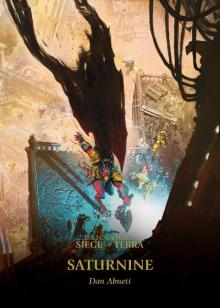 Saturnine
Saturnine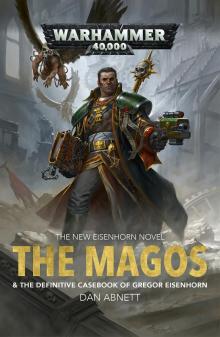 The Magos
The Magos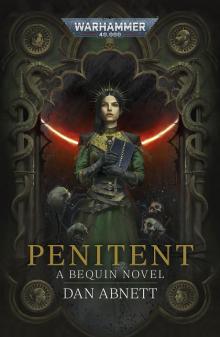 Penitent
Penitent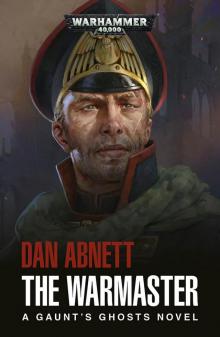 THE WARMASTER
THE WARMASTER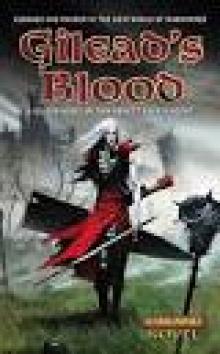 Gilead's Blood
Gilead's Blood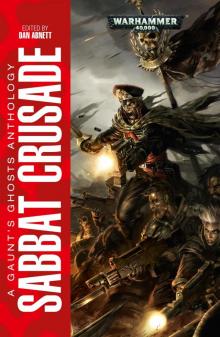 Sabbat Crusade
Sabbat Crusade![[Warhammer 40K] - Double Eagle Read online](http://i1.bookreadfree.com/i/03/16/[warhammer_40k]_-_double_eagle_preview.jpg) [Warhammer 40K] - Double Eagle
[Warhammer 40K] - Double Eagle![[Gaunt's Ghosts 02] - Ghostmaker Read online](http://i1.bookreadfree.com/i/03/16/[gaunts_ghosts_02]_-_ghostmaker_preview.jpg) [Gaunt's Ghosts 02] - Ghostmaker
[Gaunt's Ghosts 02] - Ghostmaker![[Gaunt's Ghosts 10] - The Armour of Contempt Read online](http://i1.bookreadfree.com/i/03/16/[gaunts_ghosts_10]_-_the_armour_of_contempt_preview.jpg) [Gaunt's Ghosts 10] - The Armour of Contempt
[Gaunt's Ghosts 10] - The Armour of Contempt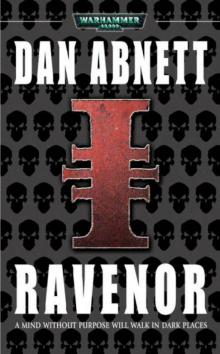 Ravenor
Ravenor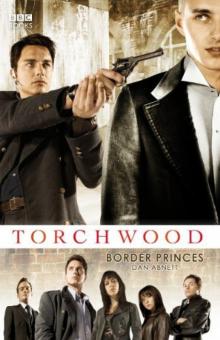 Border Princes
Border Princes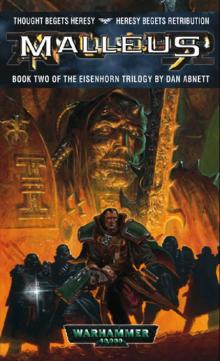 Warhammer - Eisenhorn 02 - Malleus (Abnett, Dan)
Warhammer - Eisenhorn 02 - Malleus (Abnett, Dan)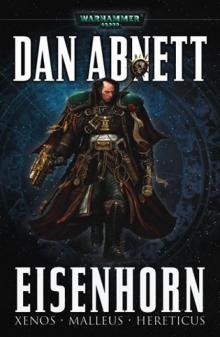 Eisenhorn Omnibus
Eisenhorn Omnibus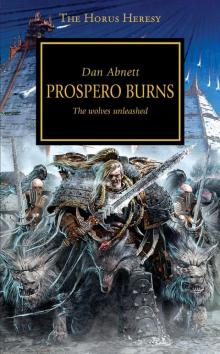 Prospero Burns
Prospero Burns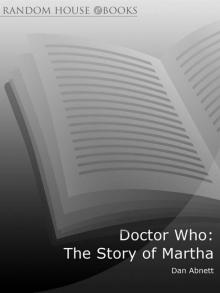 The Story of Martha
The Story of Martha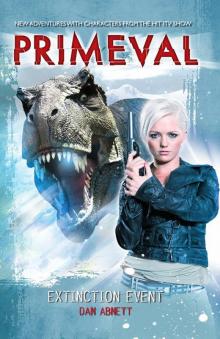 Extinction Event
Extinction Event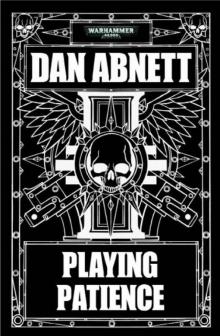 Playing Patience
Playing Patience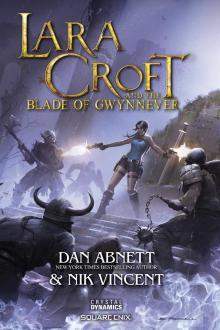 Lara Croft and the Blade of Gwynnever
Lara Croft and the Blade of Gwynnever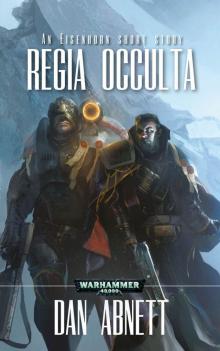 Regia Occulta
Regia Occulta![[Gaunt's Ghosts] - The Iron Star Read online](http://i1.bookreadfree.com/i/03/13/[gaunts_ghosts]_-_the_iron_star_preview.jpg) [Gaunt's Ghosts] - The Iron Star
[Gaunt's Ghosts] - The Iron Star![[Warhammer] - Fell Cargo Read online](http://i1.bookreadfree.com/i/03/13/[warhammer]_-_fell_cargo_preview.jpg) [Warhammer] - Fell Cargo
[Warhammer] - Fell Cargo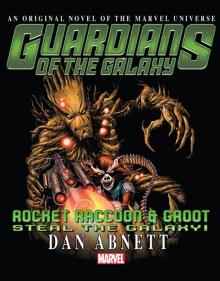 GUARDIANS OF THE GALAXY: ROCKET RACCOON & GROOT STEAL THE GALAXY!
GUARDIANS OF THE GALAXY: ROCKET RACCOON & GROOT STEAL THE GALAXY!![[Ravenor 01] Ravenor - Dan Abnett Read online](http://i1.bookreadfree.com/i/03/20/[ravenor_01]_ravenor_-_dan_abnett_preview.jpg) [Ravenor 01] Ravenor - Dan Abnett
[Ravenor 01] Ravenor - Dan Abnett![[Gaunt's Ghosts 06] - Straight Silver Read online](http://i1.bookreadfree.com/i/03/17/[gaunts_ghosts_06]_-_straight_silver_preview.jpg) [Gaunt's Ghosts 06] - Straight Silver
[Gaunt's Ghosts 06] - Straight Silver![[Ravenor 02] Ravenor Returned - Dan Abnett Read online](http://i1.bookreadfree.com/i/03/20/[ravenor_02]_ravenor_returned_-_dan_abnett_preview.jpg) [Ravenor 02] Ravenor Returned - Dan Abnett
[Ravenor 02] Ravenor Returned - Dan Abnett![[Gaunt's Ghosts 08] - Traitor General Read online](http://i1.bookreadfree.com/i/03/14/[gaunts_ghosts_08]_-_traitor_general_preview.jpg) [Gaunt's Ghosts 08] - Traitor General
[Gaunt's Ghosts 08] - Traitor General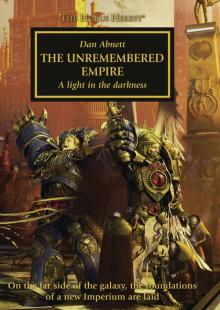 The Unremembered Empire
The Unremembered Empire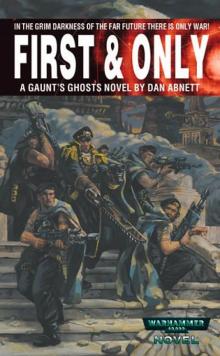 First and Only
First and Only![[Darkblade 05] - Lord of Ruin Read online](http://i1.bookreadfree.com/i/03/15/[darkblade_05]_-_lord_of_ruin_preview.jpg) [Darkblade 05] - Lord of Ruin
[Darkblade 05] - Lord of Ruin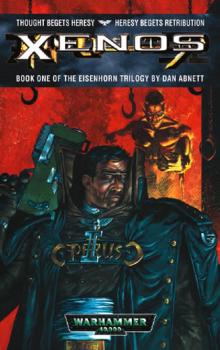 Warhammer - Eisenhorn 01 - Xenos (Abnett, Dan)
Warhammer - Eisenhorn 01 - Xenos (Abnett, Dan) Meduson
Meduson The Fall of Malvolion
The Fall of Malvolion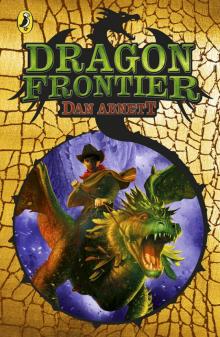 Dragon Frontier
Dragon Frontier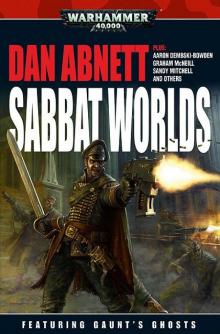 Sabbat Worlds
Sabbat Worlds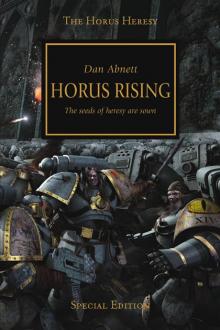 Horus Rising
Horus Rising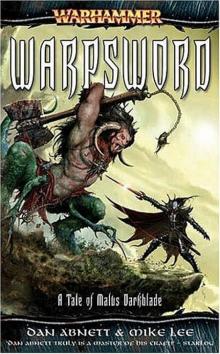 Warhammer - Darkblade 04 - Warpsword
Warhammer - Darkblade 04 - Warpsword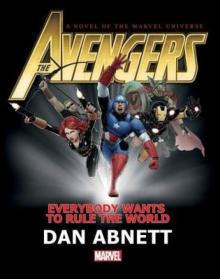 Avengers_Everybody Wants to Rule the World_Marvel Comics Prose
Avengers_Everybody Wants to Rule the World_Marvel Comics Prose![[Gaunt's Ghosts 04] - Honour Guard Read online](http://i1.bookreadfree.com/i/03/16/[gaunts_ghosts_04]_-_honour_guard_preview.jpg) [Gaunt's Ghosts 04] - Honour Guard
[Gaunt's Ghosts 04] - Honour Guard![[Darkblade 04] - Warpsword Read online](http://i1.bookreadfree.com/i/03/16/[darkblade_04]_-_warpsword_preview.jpg) [Darkblade 04] - Warpsword
[Darkblade 04] - Warpsword![[Gaunt's Ghosts 11] - Only in Death Read online](http://i1.bookreadfree.com/i/03/16/[gaunts_ghosts_11]_-_only_in_death_preview.jpg) [Gaunt's Ghosts 11] - Only in Death
[Gaunt's Ghosts 11] - Only in Death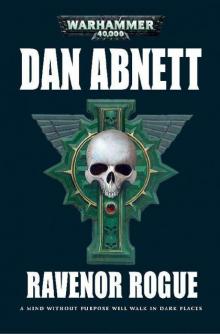 Ravenor Rogue
Ravenor Rogue![[Ravenor 03] Ravenor Rogue - Dan Abnett Read online](http://i1.bookreadfree.com/i/03/16/[ravenor_03]_ravenor_rogue_-_dan_abnett_preview.jpg) [Ravenor 03] Ravenor Rogue - Dan Abnett
[Ravenor 03] Ravenor Rogue - Dan Abnett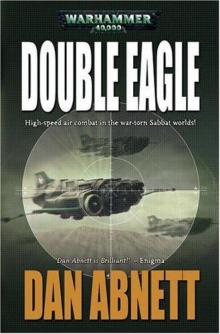 Double Eagle
Double Eagle Doctor Who - The Silent Stars Go By
Doctor Who - The Silent Stars Go By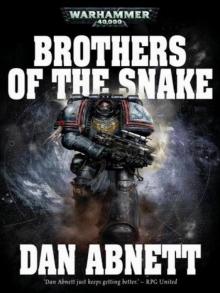 Brothers of the Snake
Brothers of the Snake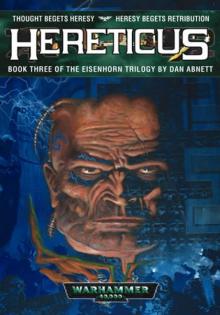 Warhammer - Eisenhorn 03 - Hereticus (Abnett, Dan)
Warhammer - Eisenhorn 03 - Hereticus (Abnett, Dan)![[Darkblade 03] - Reaper of Souls Read online](http://i1.bookreadfree.com/i/03/16/[darkblade_03]_-_reaper_of_souls_preview.jpg) [Darkblade 03] - Reaper of Souls
[Darkblade 03] - Reaper of Souls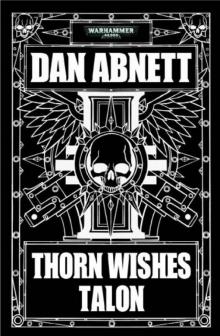 Thorn Wishes Talon
Thorn Wishes Talon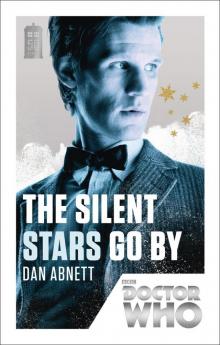 Doctor Who
Doctor Who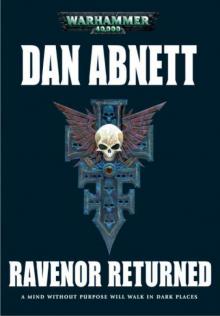 Ravenor Returned
Ravenor Returned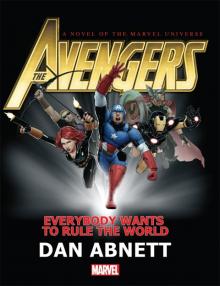 Avengers: Everybody Wants to Rule the World
Avengers: Everybody Wants to Rule the World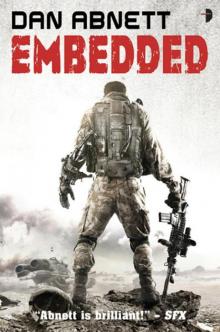 Embedded
Embedded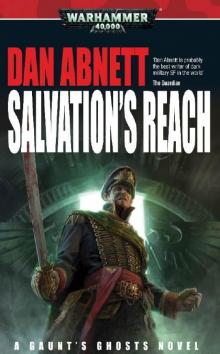 Salvation's Reach
Salvation's Reach![[Gaunt's Ghosts 03] - Necropolis Read online](http://i1.bookreadfree.com/i/03/19/[gaunts_ghosts_03]_-_necropolis_preview.jpg) [Gaunt's Ghosts 03] - Necropolis
[Gaunt's Ghosts 03] - Necropolis![[Darkblade 01] - The Daemon's Curse Read online](http://i1.bookreadfree.com/i/03/17/[darkblade_01]_-_the_daemons_curse_preview.jpg) [Darkblade 01] - The Daemon's Curse
[Darkblade 01] - The Daemon's Curse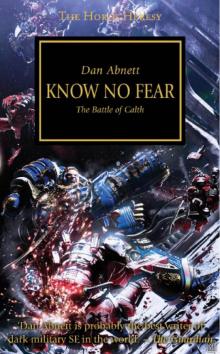 Know No Fear
Know No Fear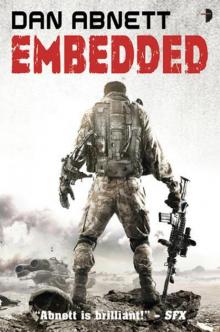 Dan Abnett - Embedded
Dan Abnett - Embedded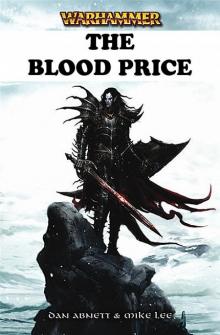 00.1 - The Blood Price
00.1 - The Blood Price![[Warhammer 40K] - Sabbat Worlds Read online](http://i1.bookreadfree.com/i/03/17/[warhammer_40k]_-_sabbat_worlds_preview.jpg) [Warhammer 40K] - Sabbat Worlds
[Warhammer 40K] - Sabbat Worlds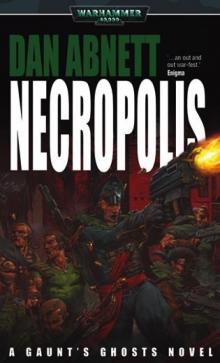 Necropolis
Necropolis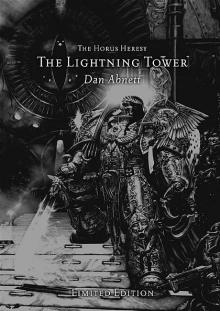 The Lightning Tower & The Dark King
The Lightning Tower & The Dark King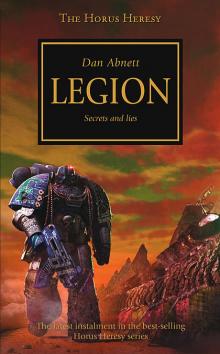 Legion
Legion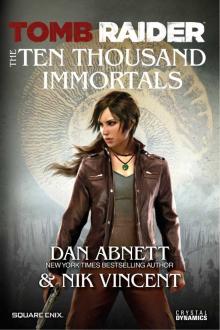 Tomb Raider: The Ten Thousand Immortals
Tomb Raider: The Ten Thousand Immortals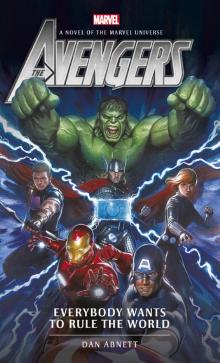 Avengers
Avengers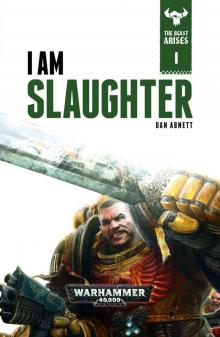 I am Slaughter
I am Slaughter![[Gaunt's Ghosts 07] - Sabbat Martyr Read online](http://i1.bookreadfree.com/i1/04/02/[gaunts_ghosts_07]_-_sabbat_martyr_preview.jpg) [Gaunt's Ghosts 07] - Sabbat Martyr
[Gaunt's Ghosts 07] - Sabbat Martyr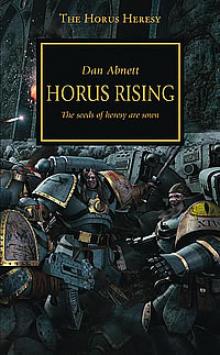 The Horus Heresy: Horus Rising
The Horus Heresy: Horus Rising![[Gaunt's Ghosts 01] - First & Only Read online](http://i1.bookreadfree.com/i1/04/02/[gaunts_ghosts_01]_-_first_&_only_preview.jpg) [Gaunt's Ghosts 01] - First & Only
[Gaunt's Ghosts 01] - First & Only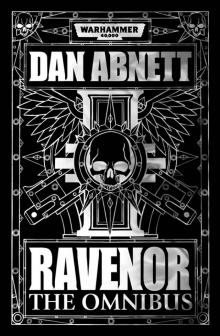 Ravenor Omnibus
Ravenor Omnibus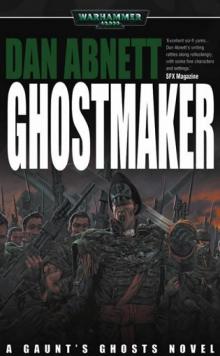 Ghostmaker
Ghostmaker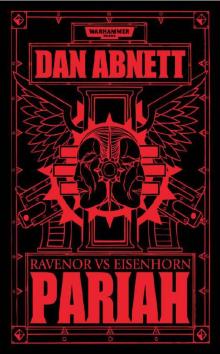 Pariah: Eisenhorn vs Ravenor
Pariah: Eisenhorn vs Ravenor![[Gaunt's Ghosts 12] - Blood Pact Read online](http://i1.bookreadfree.com/i1/04/04/[gaunts_ghosts_12]_-_blood_pact_preview.jpg) [Gaunt's Ghosts 12] - Blood Pact
[Gaunt's Ghosts 12] - Blood Pact![[Gaunt's Ghosts 05] - The Guns of Tanith Read online](http://i1.bookreadfree.com/i1/04/01/[gaunts_ghosts_05]_-_the_guns_of_tanith_preview.jpg) [Gaunt's Ghosts 05] - The Guns of Tanith
[Gaunt's Ghosts 05] - The Guns of Tanith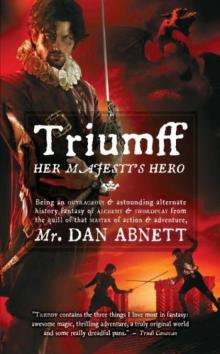 Triumff: Her Majesty's Hero
Triumff: Her Majesty's Hero![[Gaunt's Ghosts 09] - His Last Command Read online](http://i1.bookreadfree.com/i1/04/02/[gaunts_ghosts_09]_-_his_last_command_preview.jpg) [Gaunt's Ghosts 09] - His Last Command
[Gaunt's Ghosts 09] - His Last Command![[Darkblade 00.1] - The Blood Price Read online](http://i1.bookreadfree.com/i2/04/03/[darkblade_00_1]_-_the_blood_price_preview.jpg) [Darkblade 00.1] - The Blood Price
[Darkblade 00.1] - The Blood Price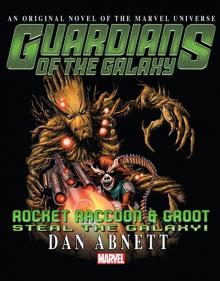 Guardians of the Galaxy: Rocket Raccoon and Groot - Steal the Galaxy!
Guardians of the Galaxy: Rocket Raccoon and Groot - Steal the Galaxy!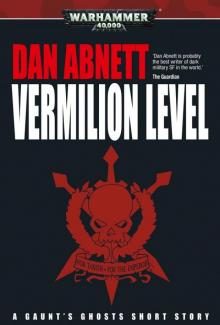 Vermilion Level
Vermilion Level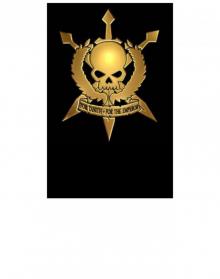 In Remembrance
In Remembrance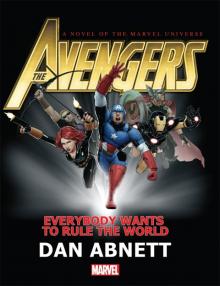 The Avengers: Everybody Wants to Rule the World
The Avengers: Everybody Wants to Rule the World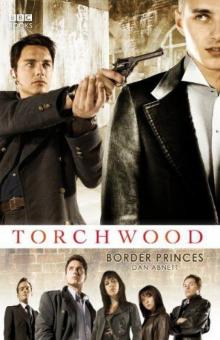 Border Princes t-2
Border Princes t-2![[Darkblade 02] - Bloodstorm Read online](http://i1.bookreadfree.com/i2/04/07/darkblade_02_-_bloodstorm_preview.jpg) [Darkblade 02] - Bloodstorm
[Darkblade 02] - Bloodstorm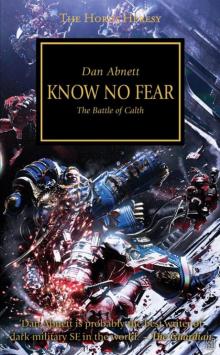 Know no fear. The Battle of Calth hh-19
Know no fear. The Battle of Calth hh-19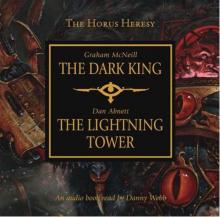 The Dark King and The Lightning Tower
The Dark King and The Lightning Tower